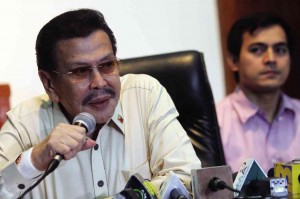Manila truck ban pits Estrada vs business org
MANILA, Philippines—After regulating the entry of buses to ease traffic, the city of Manila is imposing an expanded truck ban starting next week, a measure affecting the cargo moving business while promising relief to other motorists and commuters.
Before the ban could even take effect, the head of a truckers’ organization warned of dire economic consequences, saying its proponents at City Hall were committing “political suicide” by undermining port operations in the city itself.
Starting Monday, Feb. 10, eight-wheel trucks and vehicles with gross weight above 4,500 kilograms are barred from using Manila roads from 5 a.m. to 9 p.m. That’s a total of 16 hours, or seven hours longer than the previous ban.
They can operate only from 9 p.m. to 5 a.m.—and only on designated truck routes. On Sundays and holidays, they can take these routes anytime of the day.
Trucks carrying perishable goods and petroleum products are exempted from the ban, as well as vehicles used for government projects.
Article continues after this advertisementVehicles that need to deliver construction materials outside the truck routes should seek permission from the Manila Traffic and Parking Bureau. Violators must pay a P5,000 fine or their vehicles will be impounded.
Article continues after this advertisementAn ordinance calling for the daytime ban was signed Wednesday by former President and now Manila Mayor Joseph Estrada, who said he would be “ready to face any resistance.”
“I might wear my fatigue uniform again,” Estrada said, referring to the military outfit he wore in August last year when he confronted defiant drivers who tried to enter the city despite the bus ban.
A separate, metrowide truck ban is imposed by the Metropolitan Manila Development Authority (MMDA), from 6 a.m. to 10 a.m. and from 5 p.m. to 10 p.m, every day except Sundays and holidays.
Councilor Manuel Zarcal, the main proponent of the new ban in Manila, said the previous ban was from 6 a.m. to 9 a.m. and 3 p.m. to 9 p.m. With the implementation of a longer ban, additional truck routes were designated, he said.
Vice Mayor Francisco “Isko Moreno” Domagoso warned truckers against staging a protest by blocking roads with their vehicles. “We are coordinating with all towing companies in Metro Manila to accommodate 4,000 (impounded) trucks,” he said. That’s about the number of trucks passing through the city daily, he said.
In July 2013, the truckers group Aduana Business Club Inc. (ABCI) protested a law on overloading by forming a caravan on Roxas Boulevard. Though the action was directed at the Department of Public Works and Highways, the resulting traffic jam drew the ire of Estrada, who warned the group not to do it again.
Domagoso maintained that proper consultations on the ordinance were held with various stakeholders through public hearings and a traffic summit.
Reached for comment, ABCI president Mary Zapata called the new ban a form of political suicide on the part of its proponents and a bane to a country heavily dependent on imports.
“If the trucks stop, the economy will stop,” Zapata told the Inquirer. “If delivery (hours) for cargo are shortened, there will be congestion at the port.”
“Who operates at nighttime to accommodate deliveries? The factories that will receive the cargo, the shipping lines—they will not accommodate our transactions,” she said.
Zapata said various trucking companies voiced their opposition to the new ban during the first hearing conducted by the council. They would meet among themselves this Monday to plan their next step, she said.
“If (the city government is) decided on implementing this, we will ask the trade and transportation departments and Malacañang to step in,” she added.—With a report from Jaymee Gamil
Originally posted at 3:16 pm | Wednesday, February 5, 2014
RELATED STORIES
Total truck ban in Metro opposed
